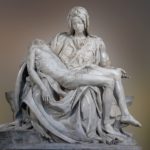The Gospel tells us about the following episode regarding this topic:
39 And one of those robbers who were hanged, blasphemed him, saying: If thou be Christ, save thyself and us.
40 But the other answering, rebuked him, saying: Neither dost thou fear God, seeing thou art condemned under the same condemnation?
41 And we indeed justly, for we receive the due reward of our deeds; but this man hath done no evil.
42 And he said to Jesus: Lord, remember me when thou shalt come into thy kingdom.
43 And Jesus said to him: Amen I say to thee, this day thou shalt be with me in paradise.
Luke 23: 39-43
Why was Saint Dimas saved by Jesus?
The good thief, Saint Dimas, was saved for several reasons, and not just by asking Jesus to remember him:
- He recognized that Jesus was the son of God.
- Manifests fear of God (important and deserved respect for God).
- Recognized that Jesus has a kingdom.
- He asks Jesus to remember him, that is, to have mercy on him.
- He confesses in front of Jesus (and everyone who was there) that his punishment is just and that he deserves it for what he did. This means that he had previously repented.
- Defended Jesus against the taunts of the other thief, and before the people who were witnessing the event.
- He pays penance for his sins at the crucifixion, and therefore is pure enough to be with Jesus.
The evil thief, known as Gestas, on the other hand, made fun of Jesus, even though that he was undergoing the same punishment. His suffering would probably pay for what he had done in this life, but he did not recognize Jesus as God or his savior.
He also sinned with pride, even in death, the moment he commanded Jesus to save himself and them.
32 Every one therefore that shall confess me before men, I will also confess him before my Father who is in heaven.
33 But he that shall deny me before men, I will also deny him before my Father who is in heaven.
Matthew 10: 32-33
Jesus is the lamb without stain, he had no sin, so he did not require forgiveness from anyone. He voluntarily gave up his life and went through all that suffering for our salvation.
We can imitate Him and give our lives for someone else, or we can offer our sufferings in reparation for our, or someone else’s sins. We can also do this for someone else eternal rest.
In general terms, we need to purify ourselves for the forgiveness of our sins. Aside from acknowledging and confessing our sins, we need to make amends and try our best never to sin again.
We have the sacrament of reconciliation for the confession and forgiveness of our sins. However, to repair and amend our sins we have to do penance. We can ask for the forgiveness of those we offend, we can pay them back for example if we steal for them.
We can also offer God our daily sufferings, fast, or pray the rosary. Especially if there is nothing else we can do to amend those sins.
What we do not pay in this world we will pay in the next. If by the Lord’s mercy, it is His will that we will be saved, we can pay for our sins in purgatory.
The lesson is to be humble, and to follow in the footsteps of Saint Dimas for our salvation.
About the autor
Ele V
Ele is a devout Christian who loves to learn and share about the beauty of the Catholic Faith.
Popular Posts
Donate! Buy me a Coffee!



